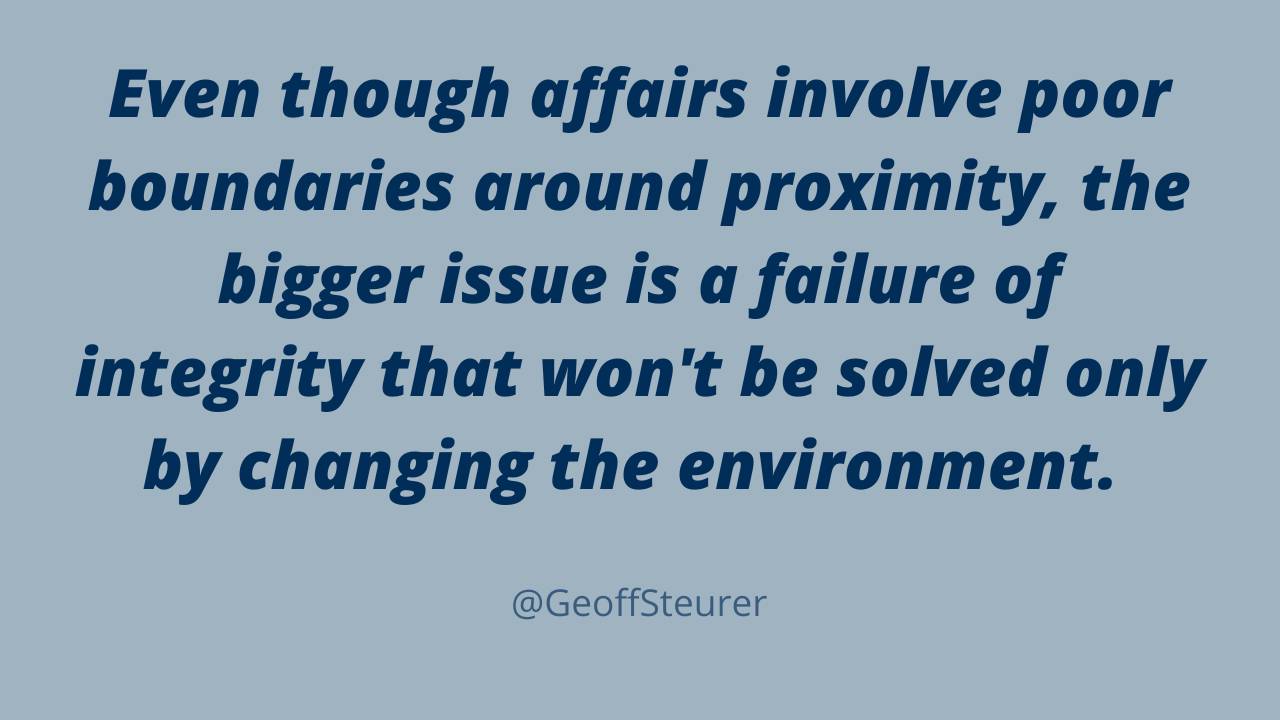Q&A with Geoff: How Can I Feel Safe After My Husband's Affair?
Jul 12, 2023
Question
I wonder what would be considered an unreasonable request. My husband had an affair with a colleague, and, ideally, I would like him to quit this job. It wouldn't affect us financially as this was an additional job. However, the problem is I just think I'd still worry regardless of what job he got. Would I be thinking he would just meet someone else even better than the last one? So perhaps it's better to just let him keep the existing job where it has now fizzled out. Is it better for me to just work on myself, and my own ability to build trust, rather than asking him to change parts of his/our life? I'm finding this question difficult to answer because I think I'll only feel safe and secure by allowing myself to as I'm not sure any physical changes or requests would do much of anything.
Answer
The aftermath of an affair introduces dilemmas that are hard to solve, especially when they involve major lifestyle and living decisions such as career, housing, and so on. One of the consequences of broken trust is that it makes it hard to feel safe almost anywhere. The healthiest approach to creating this kind of safety is a combination of changing external and internal factors. Let's talk about how you might be able to do this.
Please recognize that the question of what constitutes an "unreasonable" request after infidelity is complex. There's no one-size-fits-all answer, and it largely depends on the specific circumstances and individuals involved. But there are some principles that can guide your thinking.
Trust, in any relationship, is like a structure that must be rebuilt brick by brick after it's been damaged. In this rebuilding process, there are things both you and your partner can do. A significant task for you is to speak up about what you are feeling and what you need. Open, honest communication is key to rebuilding trust and it's entirely appropriate for you to voice your concerns and feelings about his continued involvement in this work environment.
Asking your husband to change jobs might not necessarily be an unreasonable request, especially if the presence of the person he had an affair with continues to trigger feelings of insecurity and doubt for you. While we can't control the actions of others, we can create environments that are more conducive to maintaining the commitments we've made.
If your husband disregards your feelings about how his work environment impacts your security and safety, then there is more work for him to do with compassion, empathy, and taking accountability for the damage he has created. It's healthy for him to counsel with you and really understand what this is like for you to have him go to work every day in that same environment. Even though affairs involve poor boundaries around proximity, the bigger issue is a failure of integrity that won't be solved only by changing the environment. Even though proximity can tempt someone to be unfaithful, real integrity will always create the most safety. Fidelity is the bedrock of the kind of relationship you are entitled to have.
While it's natural to fear that he’ll have another affair, recognize that it could also be an indication that there are deeper issues to address. His responses to your fears about future affairs ideally would be filled with patience, understanding, accountability, and reassurance. More importantly, you would also observe him adjusting in his world to prioritize you and your relationship. If he believes life should just go on as normal, it’s perfectly reasonable to expect something different. Most couples benefit from seeking professional help to work through affair recovery.
The affair is certainly damaging, but the other abusive dynamics that protected the affair are often more damaging to the trust and security of the relationship. The fallout from lying, gaslighting, omitting, blaming, and criticism can leave a relationship wounded long after the affair has ended. True healing requires a depth of humility that can’t be overstated. There should be sincere remorse, accountability, and actions taken to mend the relationship.
Your instinct to work on yourself and improve your own ability to trust is a crucial part of the equation, too. This is important work for you to do even if your husband never becomes a trustworthy person. Learning to trust people who are trustworthy is a critical part of improving your mental health. Obviously, he has a responsibility to become trustworthy, but your willingness to ultimately open back up to trust is your responsibility.
I commend you for your willingness to understand your own responses and seek better ways to thrive as an individual. It’s tempting to become passive when you’ve been betrayed and expect the other person to fix everything. Even though he certainly has the lion’s share of work to do, you have a healing journey as well that needs attention. Stay committed to see you where you can grow and improve.
Remember that it's not unreasonable to ask for changes that could help this process, nor is it unnecessary to examine your own feelings and reactions. Don’t allow yourself to fixate on safety for so long that you give up on seeking personal growth. Both approaches are crucial for long-term healing.
FREE: 3 Steps to End Your Marriage Argument
Download my free PDF guide and start making real progress to healing
We hate SPAM. We will never sell your information, for any reason.




